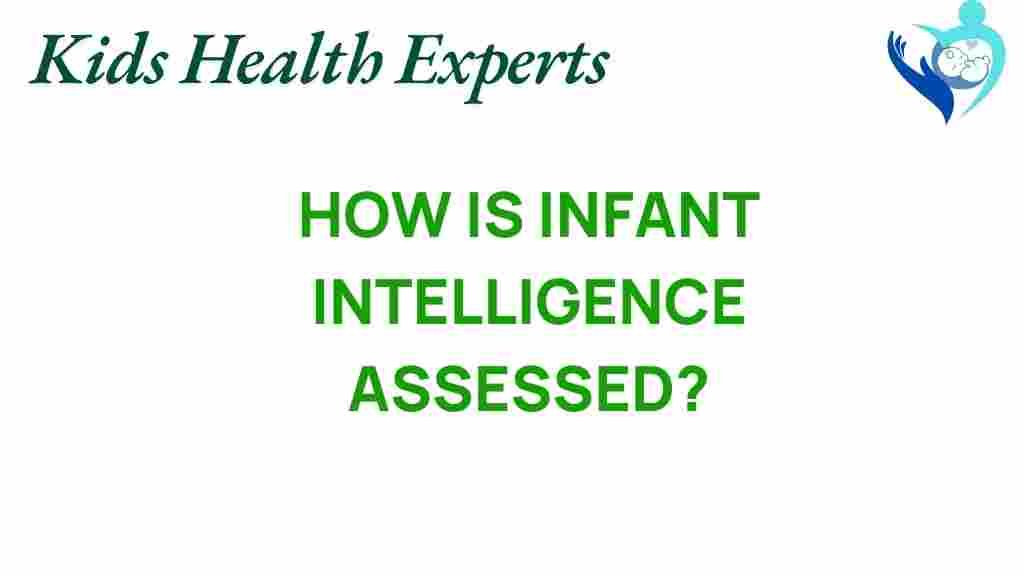Unraveling the Mysteries: How Infant Intelligence Is Assessed
The journey of understanding infant intelligence is both fascinating and complex. Parents and caregivers often wonder how to gauge the cognitive development of their little ones as they reach various early childhood milestones. Assessing infant intelligence involves a blend of observation, testing methods, and an understanding of brain development. This article delves into the ways in which infant intelligence is assessed, providing insights for parents and professionals alike.
The Importance of Assessing Infant Intelligence
Understanding infant intelligence is crucial for several reasons:
- Early Intervention: Identifying developmental delays can lead to timely interventions, which can significantly enhance cognitive outcomes.
- Tailored Parenting: Knowing where a child stands in terms of cognitive development helps parents tailor their interactions and learning opportunities.
- Research and Policy: Insights from assessments can shape educational policies and practices.
Cognitive Development: A Foundation for Infant Intelligence
Cognitive development refers to the progression of a child’s ability to think, learn, and solve problems. This development occurs rapidly in infancy and is influenced by both genetics and environmental factors. Key components of cognitive development include:
- Memory: The ability to retain and recall information.
- Language Skills: The development of understanding and using language.
- Problem Solving: The ability to identify and solve challenges.
- Social Understanding: Recognizing and responding to social cues.
Key Milestones in Early Childhood
During the early years, infants reach several cognitive milestones that reflect their intelligence:
- 0-3 Months: Recognition of familiar faces and sounds.
- 4-6 Months: Improved attention span and ability to track moving objects.
- 7-12 Months: Beginning of problem-solving skills, such as manipulating objects.
- 1-2 Years: Language acquisition and understanding of simple instructions.
These milestones are not only indicators of cognitive development but also serve as benchmarks for assessing infant intelligence.
Testing Methods for Assessing Infant Intelligence
There are several methods used to assess infant intelligence. Here are some common approaches:
- Standardized Tests: Instruments such as the Bayley Scales of Infant and Toddler Development evaluate cognitive, language, and motor skills.
- Observational Assessments: Caregivers or trained professionals observe infants in natural settings to gauge their responses to various stimuli.
- Parental Reports: Questionnaires and checklists completed by parents can provide insights into a child’s behavior and development.
The Role of Brain Development in Infant Intelligence
Brain development is a crucial factor in assessing infant intelligence. During the first three years of life, a child’s brain undergoes rapid growth and forms millions of neural connections. Factors influencing brain development include:
- Nutrition: Proper nutrition is essential for brain health and development.
- Stimulation: Engaging with infants through play and conversation fosters cognitive growth.
- Environment: A safe and enriched environment supports healthy brain development.
Step-by-Step Process for Assessing Infant Intelligence
Assessing infant intelligence can be approached systematically:
- Choose the Right Time: Ensure the assessment is conducted when the infant is well-rested and in a good mood.
- Select Appropriate Testing Methods: Consider a combination of standardized tests and observational assessments.
- Engage the Child: Use toys and activities that interest the infant to keep them engaged during the assessment.
- Document Observations: Take detailed notes on the child’s responses and behavior during the assessment.
- Analyze Results: Compare findings with developmental milestones and norms to gauge infant intelligence.
Troubleshooting Tips for Parents
Sometimes, assessments might not go as planned. Here are a few troubleshooting tips:
- Be Patient: Infants may not always perform consistently. Allow for breaks and try again later.
- Stay Calm: Your demeanor can affect the infant’s behavior. Stay relaxed and positive.
- Adjust Expectations: Remember that each child develops at their own pace. Use assessments as a guide, not a definitive measure.
Parenting and Its Impact on Infant Intelligence
Parenting plays a vital role in the cognitive development and assessment of infant intelligence. Here are some ways that effective parenting can foster cognitive growth:
- Interactive Play: Engaging in play that encourages exploration and problem-solving.
- Reading Aloud: Introducing books early on helps develop language skills and comprehension.
- Limit Screen Time: Encouraging real-world interactions rather than passive screen time promotes active learning.
For further insights on effective parenting strategies, visit this resource.
Conclusion
Assessing infant intelligence is a multifaceted process that encompasses various methods and factors. Understanding cognitive development, recognizing early childhood milestones, and utilizing effective testing methods are essential for parents and caregivers. By fostering a nurturing environment and engaging actively with infants, parents can significantly influence their child’s cognitive growth. Remember, the journey of assessing infant intelligence is not just about testing; it’s about understanding and supporting your child’s unique developmental path. For more information about cognitive development and parenting, check out this informative article.
This article is in the category Growth and created by KidsHealthExperts Team
